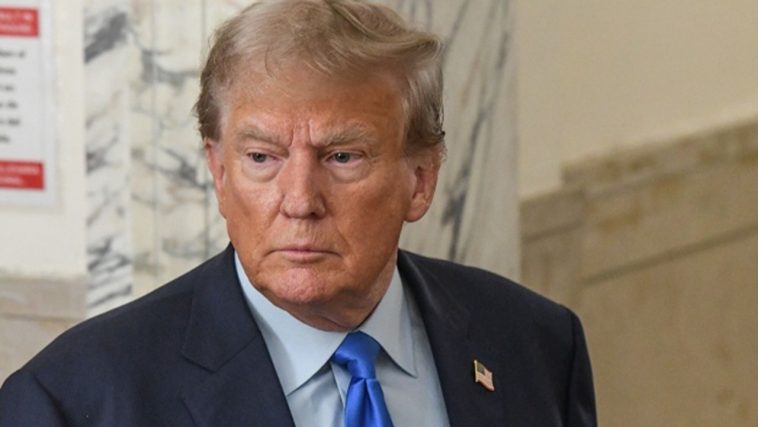LISTEN HERE:
Scuttling an unorthodox decision to sway the proceedings, the former President, Donald Trump, has been turned down from presenting his own closing statement in his civil fraud trial in New York. The presiding Justice, Arthur Engoron of the Manhattan Supreme Court, underscored the importance of adhering to ‘relevant, material facts.’ Communication between the Justice and Trump’s attorney, Christopher Kise, made it clear that the former commander-in-chief, age 77, could not acquiesce to the ‘lawful limits’ enforced by the court.
Kise had initially signaled to Justice Engoron in an email on January 4th that, after the attorneys had made their case in the $370 million trial taking place on Thursday, Trump would attempt to lend his voice to the proceedings. The concept, however, faced stark opposition from Andrew Amer, representative of the New York Attorney General’s Office – the prosecuting entity in this litigation. He expressed concerns about Trump’s propensity for speeches that might divert from the core subject, his apparent evasiveness and past non-compliances with court orders.
Despite Amer’s reservations, Justice Engoron was open to allowing Trump to speak, but strictly within the boundaries of what is permissible in a counsel’s closing argument. Engoron insisted on this unique condition that any dialogue from Trump should stick to the ‘relevant, material facts that are in evidence, and application of the relevant law to those facts.’
However, citing concerns over ‘proposed precondition and prior restraints’, Kise expressed his disagreement towards Engoron’s suggestion through an email response. The judge and the attorney continued their discussion, which included a request from the Trump team for a delay in the closing arguments due to a bereavement in the family – the passing of Trump’s mother-in-law, Amalija Knavs.
The request for postponement was dismissed by Justice Engoron, considering the inevitable inconvenience it would prompt for the court’s operations. Notwithstanding, he shared his sympathies, communicating to Kise, ‘Please tell Mr. Trump I am sorry.’ Once again, Engoron stressed that any participation by Trump during the final debate must fall within the confines of his pre-established stipulations.
These court proceedings sparked frustration within Trump’s team, with Kise calling out what he perceived as injustice from the bench, deeming it ‘very unfair.’ Justice Engoron, bringing the discussion to a close, firmly informed the attorney, ‘Take it or leave it,’ and made it known that there would be no more extensions for decision making.
It was just before the sounding of noon following this conversation that the record of these email correspondences was submitted to the case. The court noted that Trump’s opportunity to contribute orally during the closing arguments had elapsed.
According to the court schedule, Trump’s legal team is geared to present their side of the story on Thursday morning, while the prosecuting attorneys will take to the stand in the afternoon. Long-held tradition dictates that closing statements to cap the day’s proceedings usually span around two-and-a-half hours.
Justice Engoron, entrusted with rendering the final verdict in this case which bypasses a jury, has expressed his aspiration to reach a conclusion by the month’s end. This trial, which has its roots in way back to October, saw the courtroom sessions stretch into mid-December; the former President himself was in attendance on multiple occasions.
Throughout the court trial, Trump’s key family members – his sons Eric and Don Jr., and daughter Ivanka – were all summoned to testify. The prosecution from the Attorney General’s office alleges a decade-long misinformation campaign, claiming that Trump artificially inflated his financial statements to secure more favorable terms for loans and insurance.
Trump’s side, however, paints a very different picture of the trial. They vehemently object to the allegations, contending that the accusations are nothing but a politically motivated witch hunt orchestrated by opposition forces in the Attorney General’s office and the presiding judge.
On Wednesday, following the contentious decision made by Justice Engoron to block Trump’s closing address, Trump’s lawyer, Alina Habba, issued a brief, pointed response: ‘Is anyone surprised anymore?’ A rhetorical question casting doubt on the impartiality of the case.
The Attorney General’s office, on receiving news of Habba’s riposte, chose to maintain silence and refrained from issuing any comments on Wednesday.



